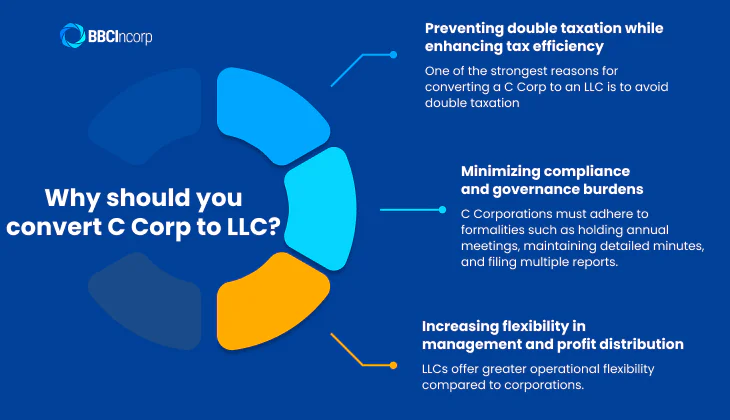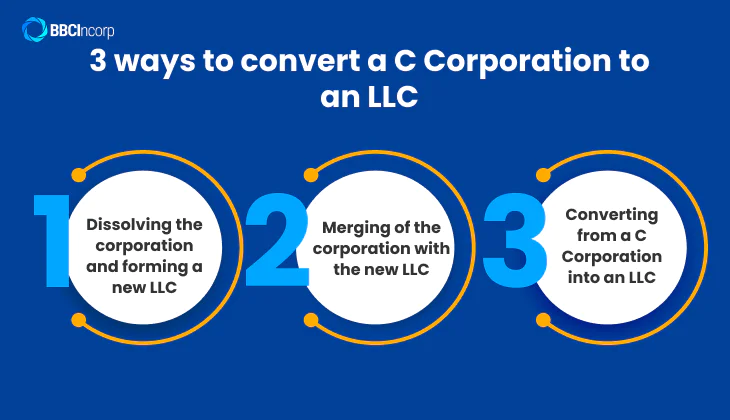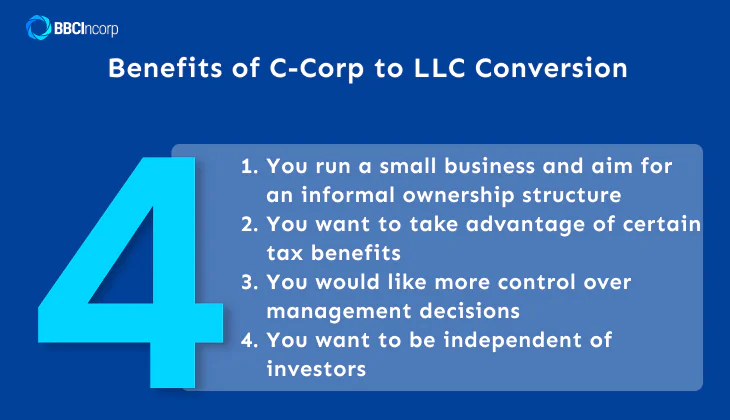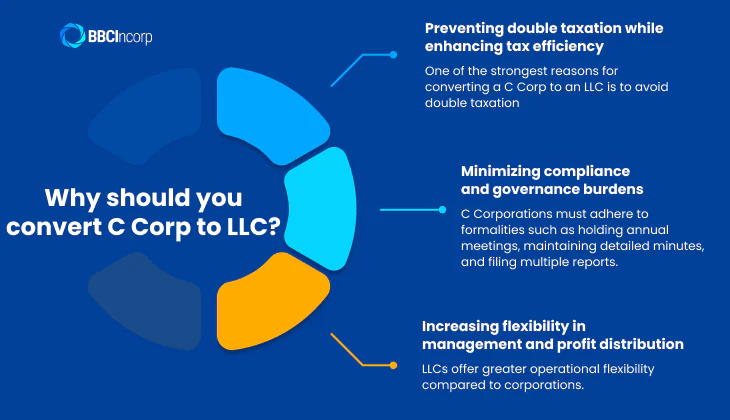
Table of Contents
Converting from a C Corporation to a Limited Liability Company (LLC) is a strategic move many business owners consider when seeking more flexibility, lower tax obligations, and simplified compliance.
While a C Corp helps attract investors, it often leads to double taxation and strict corporate governance. In contrast, an LLC offers pass-through taxation, simpler compliance, and greater control over profit distribution.
Understanding how to convert C Corp to LLC correctly is essential, as the process involves key legal and tax implications that differ by state. This guide breaks down the main reasons, methods, and considerations to help you decide whether converting your C Corporation into an LLC aligns with your long-term business goals.
Key Takeaways
- The LLC structure allows owners to avoid double taxation, streamline compliance requirements, and manage profit distribution more freely, making it an attractive option for small and mid-sized enterprises seeking operational simplicity.
- While C Corps are suited for companies aiming to attract investors and scale through share issuance, LLCs prioritize flexibility, pass-through taxation, and simpler management frameworks. Understanding these differences is key before deciding to convert.
- There are three primary ways to convert a C Corp to an LLC: dissolution and reformation, statutory merger, and direct statutory conversion.
- Conversion requires careful evaluation of timing, costs, and legal compliance.
Why should you convert C Corp to LLC?
For many small and mid-sized business owners, maintaining a C Corporation structure can become increasingly burdensome over time.
While a C Corp offers credibility and access to capital markets, it also exposes the business to double taxation, complex compliance duties, and rigid operational rules. Converting to a Limited Liability Company (LLC) allows entrepreneurs to streamline operations, enjoy tax efficiency, and maintain flexibility without compromising liability protection.

Preventing double taxation while enhancing tax efficiency
One of the strongest reasons for converting a C Corp to an LLC is to avoid double taxation.
Under the C Corp model, company profits are taxed twice, once at the corporate level and again when distributed as dividends to shareholders. LLCs, however, are treated as pass-through entities, meaning income and losses are reported directly on owners’ personal tax returns.
This eliminates the second layer of taxation and gives owners more control over how and when profits are distributed. Additionally, members can elect to be taxed as an S Corporation or partnership, further tailoring their tax strategy to suit business needs.
Minimizing compliance and governance burdens
C Corporations must adhere to formalities such as holding annual meetings, maintaining detailed minutes, and filing multiple reports. LLCs, by contrast, are less administratively demanding. They require fewer filings, no mandatory board structure, and simpler reporting obligations. This means less paperwork, lower compliance costs, and more time to focus on business growth.
Increasing flexibility in management and profit distribution
LLCs offer greater operational flexibility compared to corporations. Owners can decide how to manage the company either by themselves (member-managed) or through appointed managers (manager-managed). They also have freedom in determining how profits and losses are distributed, not necessarily in proportion to ownership percentage. This flexibility makes the LLC model especially appealing to small business owners and partnerships.
Comparison of C-Corps and LLCs
Before deciding whether to convert C Corp to LLC, it’s essential to understand the structural and operational differences between the two. Both entities offer liability protection for owners, but they diverge significantly in taxation, governance, and management flexibility.
A clear comparison helps business owners evaluate which structure better aligns with their financial strategy, growth objectives, and compliance capacity.
| Criteria | C Corporation (C Corp) | LLC (Limited Liability Company) |
| Formation | Formed by filing Articles of Incorporation; default structure for corporations. | Formed by filing Articles of Organization (or Certificate of Formation). |
| Taxation (Gains) | “Double taxation” – profits taxed at both corporate and shareholder levels. | “Pass-through” taxation – profits taxed once on members’ personal returns (LLCs may also elect to be taxed as S-Corp or C-Corp). |
| Taxation (Losses) | Losses cannot be deducted personally by shareholders. | Business losses can be deducted on owners’ personal tax returns. |
| Tax Filing | Corporation files quarterly tax returns. | Members file quarterly estimated taxes and annual self-employment returns. |
| Management | Owned by shareholders and managed by a Board of Directors and corporate officers. | Owned and managed by members, or by appointed managers. |
| Ownership | Unlimited shareholders. | Unlimited members (except S-LLC, which limits to 100). |
| Eligible Owners | Open to individuals and entities, domestic or foreign. | Most states allow both individuals and entities, domestic or foreign. |
| Stock Issuance | Can issue multiple classes of stock. | Cannot issue stock. |
| Equity Financing | Easier to raise capital via stock issuance. | Harder to raise capital; transferring ownership may require all-member consent. |
| Retention of Earnings | Dividends taxed only when distributed to shareholders. | Taxed even if profits are not distributed. |
| Limited Liability Protection | Yes, shareholders are legally separate from the corporation. | Yes, members are legally separate from the company. |
Ultimately, the choice between a C Corporation and an LLC depends on your business goals. If your priority is attracting investors and scaling through equity, a C Corp may fit better. However, if you value operational flexibility, simple compliance, and single-layer taxation, converting your C Corp into an LLC could be the more efficient path forward.
3 ways to convert a C Corporation to an LLC
If you’re heading toward a change from a C Corporation to an LLC, below are the three common ways to do it. Please be mindful that not all of these choices are approved in every state of the U.S.

Dissolving the corporation and forming a new LLC
This traditional method consists of two key steps: dissolving the C Corporation and forming a new LLC. This process takes the longest to complete and might be subject to additional fees.
Generally, you will be going through 4 steps:
Step 1: Form a new LLC
Step 2: Transfer assets and liabilities
Step 3: Exchange for LLC memberships
Step 4: Dissolve the corporation
There are exceptions, however. You can modify the process as required according to the current state of your corporation. Suppose that your corporation has no assets, forming the LLC and dissolving the C Corp can happen simultaneously.
This may be the only option for states that don’t allow conversion. Also, if your corporation has significant operating losses or heavily depreciated assets, your state authority may not allow you to merge or directly convert to an LLC.
Merging of the corporation with the new LLC
Many states like Delaware, California, or Texas permit merging methods and impose specific requirements for this process. You’ll be asked to engage in a “statutory merger”, which involves creating a new LLC and merging the former corporation into that new entity.
The process will be consisting of the following steps:
Step 1: Establish a new LLC
Step 2: Prepare a merger agreement or plan
Step 3: Obtain C Corp’s stockholders’ and LLC’s members’ consent to the merger
Step 4: Exchange shares of stock for LLC’s membership interests
Step 5: File a certificate of merger with the Secretary of State
Step 6: Dissolve the C Corp after merging
This process is more complicated and costly compared to the direct conversion method, which we’ll discuss in detail below. For instance, the New York business corporation law and New York LLC law strictly regulate the merging of corporations into LLCs in New York.
Converting from a C Corporation into an LLC (limited to several states)
Statutory conversions are considered relatively new in the US. This allows you to convert a corporation to LLC directly instead of forming a new entity. To ensure a smooth transition, make sure you have the following in place:
- Have the current directors approve the conversion plan
- Conduct a meeting to request stockholders’ approval on the conversion
- File with the secretary of state’s office and pay the fees if any
So, which states disapprove of the conversion?
Certain states that disapprove of the C Corp to LLC conversion include New York, Pennsylvania, and Montana.
Interested in starting your Delaware company?
BBCIncorp can help! Whether you’re considering LLC or C Corporation, our dedicated support team is ready to ensure a seamless company formation process.
Check our Delaware company formation service today!
Benefits of C-Corp to LLC Conversion
We summarize certain situations where choosing to convert C Corporation to LLC could benefit your business.

Situation 1: You run a small business and aim for an informal ownership structure
An LLC can have unlimited owners with no restrictions on classification or nationality. You also don’t have to take care of extensive paperwork and formalities. If you don’t require a formal corporate structure of a C Corp and would prefer to manage your business with more flexibility, then converting to an LLC may be beneficial for your company.
Situation 2: You want to take advantage of certain tax benefits
Converting a C Corp into an LLC can potentially help you gain access to certain tax benefits.
LLCs are usually taxed more favorably than C Corps since their profits and losses can be passed through to the owners and members of the LLC, so they do not have to pay corporate taxes. This can help to reduce the overall amount you have to pay.
LLCs typically benefit from pass-through taxation so as not to pay taxes at the business entity level, unless you file a Form 8832 and affirmatively elect to be treated as a corporation.
Situation 3: You would like more control over management decisions
LLCs provide their members with more control over the management decisions of the business, as members typically have the right to make day-to-day decisions without consulting with other owners.
This can be advantageous if you want more autonomy over operations and don’t need a board or shareholders to approve of essential decisions like a C Corp.
Situation 4: You want to be independent of investors
If you convert from a C Corp to an LLC, you will be free from investors’ or shareholders’ oversight and potential interference.
In a C Corp, investors may have a say in major decisions and can influence the direction of your business. Converting to an LLC will limit their influence, allowing you to remain independent while still having access to capital.
If any of these situations apply to you and your business, then converting from a C Corp to an LLC may be the right choice for you. Before making any decisions, it is best to consult with legal or tax professionals as they can provide customized advice on what structure is best for your company.
Helpful resources Is your current business structure aligning with your long-term goals? Our
Potential consequences when converting into an LLC
When converting from a C Corporation to an LLC, you must be aware of the possible consequences that may arise.
- Conversion cost & changes in tax structure
It is also important to keep in mind that the conversion process may come with added costs, depending on the state you are operating in. Additionally, the tax structure of your business may change when converting to an LLC.
- Limited investment option
LLCs tend to provide limited investment options for members, as the structure does not offer shares that can be bought and sold on the public market. This means that you may not be able to raise capital as easily as you could with a C Corp structure.
- Risks of freedom granted in LLC
Finally, it is also important to consider that the freedom granted with an LLC structure may come with some risks. Since members have more autonomy over the business, they may also be more exposed to liabilities.
For instance, members may not be required to hold regular meetings or keep minutes, which could lead to mismanagement and at times legal disputes with creditors or investors.
While converting from a C Corporation to an LLC can deliver meaningful tax and operational advantages, the process also requires careful planning and compliance with both federal and state regulations. To ensure a smooth transition and proper formation of your new entity, working with a trusted incorporation service can save you time, reduce errors, and keep your business fully compliant.
Online LLC formation service at BBCIncorp – fast and all-inclusive
Establishing an LLC no longer requires complicated paperwork or in-person procedures. BBCIncorp empowers entrepreneurs to form their LLC online quickly, securely, and in full compliance with state or offshore regulations.
Whether you’re setting up in the U.S. (e.g., Delaware, Wyoming) or in key offshore jurisdictions such as Belize, St. Vincent, or the Cayman Islands, BBCIncorp ensures your business is built on a strong legal foundation from day one.
Why choose BBCIncorp for your LLC formation?
- Streamlined digital onboarding: A 100% online process that allows you to register your LLC from anywhere, with no in-person meetings.
- Comprehensive jurisdiction coverage: Expertise across major U.S. states and top offshore destinations, ensuring full compliance and strategic tax efficiency.
- Transparent, competitive pricing: No hidden fees. Our all-inclusive packages cover everything from filings to post-formation support.
- End-to-end business support: Beyond incorporation, we assist with tax compliance, renewals, and accounting to keep your LLC in good standing.
- Secure Client Portal: Track your company setup in real time, manage documents, and communicate directly with our support team anytime.

With BBCIncorp, forming an LLC is fast, simple, and fully guided by experts — giving you more time to focus on growth while we take care of the paperwork.
Conclusion
In conclusion, deciding to convert C Corp to LLC can be a strategic move for businesses seeking greater flexibility, simplified compliance, and tax efficiency. While the process offers significant advantages, it also requires careful evaluation of potential legal and financial implications to ensure the transition aligns with your long-term business goals.
By understanding both the opportunities and challenges of converting from a C Corporation to an LLC, you can make an informed decision that supports your company’s sustainability and growth.
If you need tailored guidance or professional assistance with your conversion, don’t hesitate to reach out to our team at service@bbcincorp.com. BBCIncorp’s experts are ready to help you navigate the process smoothly and structure your new LLC with full compliance and confidence.
Frequently Asked Questions
How much does it cost to convert C Corporation to LLC in California?
The official filing fee to convert C Corp to LLC in California is US$150, as required by the California Secretary of State for processing conversion documents.
In addition to this, you may incur extra costs such as name reservation fees, annual franchise taxes, or professional service charges if you engage a business formation provider or attorney.While optional, professional assistance can help ensure that all filings are accurate, compliant, and completed without costly delays
Do I need legal assistance to convert my C Corp to an LLC?
While you can technically handle the conversion yourself, seeking legal or professional assistance is highly recommended. The process involves drafting a Plan of Conversion, obtaining shareholder approval, filing with the Secretary of State, and updating federal and state tax registrations.
Professional support ensures all requirements are met and that ownership interests, tax elections, and asset transfers are handled correctly.
What are the tax implications of converting a C Corp to an LLC?
When a C Corporation converts into an LLC, the IRS generally treats the transaction as a liquidation. This means the corporation is considered to have sold its assets, which may trigger capital gains tax on appreciated assets.
After liquidation, the shareholders are treated as having received the assets personally, which may result in additional individual-level taxation. Working with a tax professional before converting can help minimize unexpected liabilities and identify potential elections that may reduce tax burdens.
Is it beneficial to convert a C Corp to an LLC if my business is not profitable?
Yes, it can still be beneficial. Even if your business isn’t currently profitable, converting to an LLC can provide operational flexibility and simplified compliance.
LLCs are often easier to manage and allow business losses to be passed through to owners’ personal tax returns, which may offset other taxable income. However, the timing and method of conversion should be planned carefully to avoid unnecessary tax exposure.
How long does the C Corp to LLC conversion process take in California?
According to the California Secretary of State, filings are usually processed in about five business days once all required conversion documents are submitted. The exact time may vary depending on the filing method, current processing volume, and whether additional corrections are needed. For those who need faster turnaround, expedited processing services are available at an extra cost.
Using a professional formation service can further streamline the process, ensuring that your application meets state requirements and is accepted without delays. Once your filing is processed, the state will issue a Certificate of Conversion, confirming the successful conversion of your C Corporation into an LLC.
Which states allow using the non-statutory conversion (asset transfer) method to convert a C-Corp to an LLC?
Most U.S. states, including Delaware, California, Texas, and Florida, allow statutory conversion, enabling a C Corporation to change directly into an LLC by filing a certificate of conversion without dissolving the entity.
However, a few states, notably New York and Pennsylvania, do not permit statutory conversion. In these jurisdictions, businesses must instead use the non-statutory conversion (asset transfer) method, which requires dissolving the existing corporation, transferring all assets and liabilities to a newly formed LLC, and reissuing ownership interests. Because this process is more complex and may trigger additional tax implications, professional legal or tax guidance is strongly recommended before proceeding.
Disclaimer: While BBCIncorp strives to make the information on this website as timely and accurate as possible, the information itself is for reference purposes only. You should not substitute the information provided in this article for competent legal advice. Feel free to contact BBCIncorp’s customer services for advice on your specific cases.
Industry News & Insights
Get helpful tips and info from our newsletter!
Stay in the know and be empowered with our strategic how-tos, resources, and guidelines.





